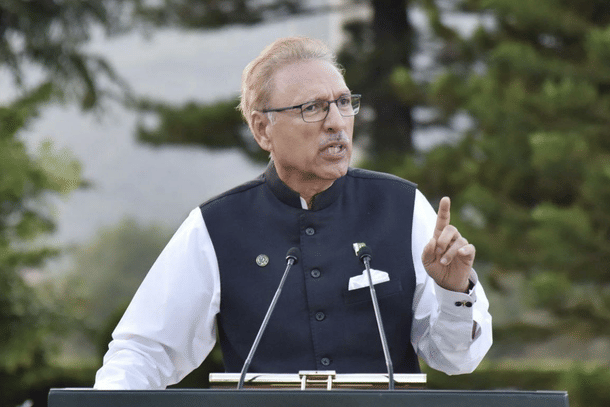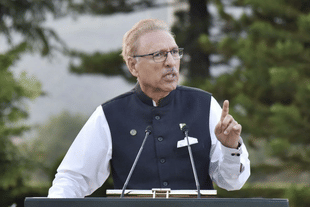World
'God Is My Witness': Pak President Says Returned Bills Amending Army Act, Secrets Law Unsigned, Staff Undermined His "Will And Command"
Swarajya Staff
Aug 21, 2023, 09:25 AM | Updated 11:02 AM IST
Save & read from anywhere!
Bookmark stories for easy access on any device or the Swarajya app.


Pakistani President Arif Alvi on denied approving changes to the Official Secrets Act and the Pakistan Army Act.
However, the Pakistan Law Ministry, which is functioning under a caretaker setup, has rebuked his statement and urged him to take responsibility for his own actions.
In a post on the social media platform X (formerly Twitter) on Sunday (20 August), the Pakistani President stated that he did not sign the Official Secrets Amendment Bill, 2023, and the Pakistan Army Amendment Bill, 2023, citing his disagreement with these laws.
Alvi explained that he had instructed his staff to return the bills unsigned within the given time frame in order to render them ineffective.
"As God is my witness, I did not sign Official Secrets Amendment Bill 2023 & Pakistan Army Amendment Bill 2023 as I disagreed with these laws. I asked my staff to return the bills unsigned within stipulated time to make them ineffective," Alvi said.
Despite confirming with his staff multiple times that the bills had been returned, President Alvi said that he found that his staff had undermined his "will and command".
"I confirmed from them many times that whether they have been returned & was assured that they were. However I have found out today that my staff undermined my will and command. As Allah knows all, He will forgive IA. But I ask forgiveness from those who will be effected," he added.
As God is my witness, I did not sign Official Secrets Amendment Bill 2023 & Pakistan Army Amendment Bill 2023 as I disagreed with these laws. I asked my staff to return the bills unsigned within stipulated time to make them ineffective. I confirmed from them many times thatâ¦
— Dr. Arif Alvi (@ArifAlvi) August 20, 2023
Later in the day, the Pakistani Law Ministry expressed “grave concern” over the president’s post, saying that he had “chosen to discredit his own officials” and he should “take responsibility for his own actions”.
In a press release, it said as per Article 75 of Pakistani Constitution, when a bill is sent for assent, "the president has two options: either give assent, or refer the matter to the parliament with specific observations”.
It added that Article 75 does not provide for any third option.
Neither of the requirements were fulfilled in the present matter, the Pakistani Law Ministry noted.
“Instead, the President purposely delayed the assent,” it alleged. “Returning the bills without any observations or assent is not provided for in the Constitution. Such a course of action is against the letter and spirit of the Constitution,” it added, reports Dawn News.
According to the Dawn News report, Alvi was said to have given his assent to the Official Secrets (Amendment) Bill, 2023 and the Pakistan Army (Amendment) Bill, 2023 on Saturday.
However, the current legal status of these bills is now uncertain due to Alvi's remarks, the newspaper reported.
Amid criticism from the Opposition lawmakers, both the bills were approved by the Pakistani Senate and National Assembly and were subsequently sent to the president for his approval.
Following Alvi's statement, a gazette notification issued by the Senate Secretariat surfaced, stating that the two bills were considered to have been assented by the president.
According to the notification obtained by Dawn.com, the Official Secrets (Amendment) Bill, 2023 has been approved by the president, effective from 17 August. Similarly, the Pakistan Army (Amendment) Bill, 2023 has been approved from 11 August.
A new offence has been introduced under Section 6-A of the Official secrets act, which prohibits the unauthorised disclosure of identities belonging to members of intelligence agencies, informants, or sources.
This offence carries a maximum punishment of three years in jail and a fine of up to 10 million Pakistani rupees.
The Army Act now allows for the punishment of up to five years of rigorous imprisonment for anyone found guilty of disclosing information, acquired in an official capacity, that may be detrimental to the security and interests of Pakistan or the armed forces, according to the Dawn report.
One of the amendments in the act grants additional powers to the army chief and prohibits ex-servicemen from engaging in politics or pursuing ventures that could potentially conflict with the interests of the army. The amendment also introduces imprisonment as a penalty for defamation of the army.
The new law also forbids any person subject to the army act from engaging in any kind of political activity for two years from the date of their “retirement, release, resignation, discharge, removal or dismissal from the service.
Meanwhile, Imran Khan's PTI - the political party on whose ticket Alvi contested the 2018 elections before being made president - announced on X that it would take the matter to the Supreme Court.
It thanked the president for “rising above fears and taking a stand for the Constitution and law, the fundamental rights of citizens and the survival and security of democracy and the Parliament”.
The party also declared “complete support” for the president at national and judicial levels.





